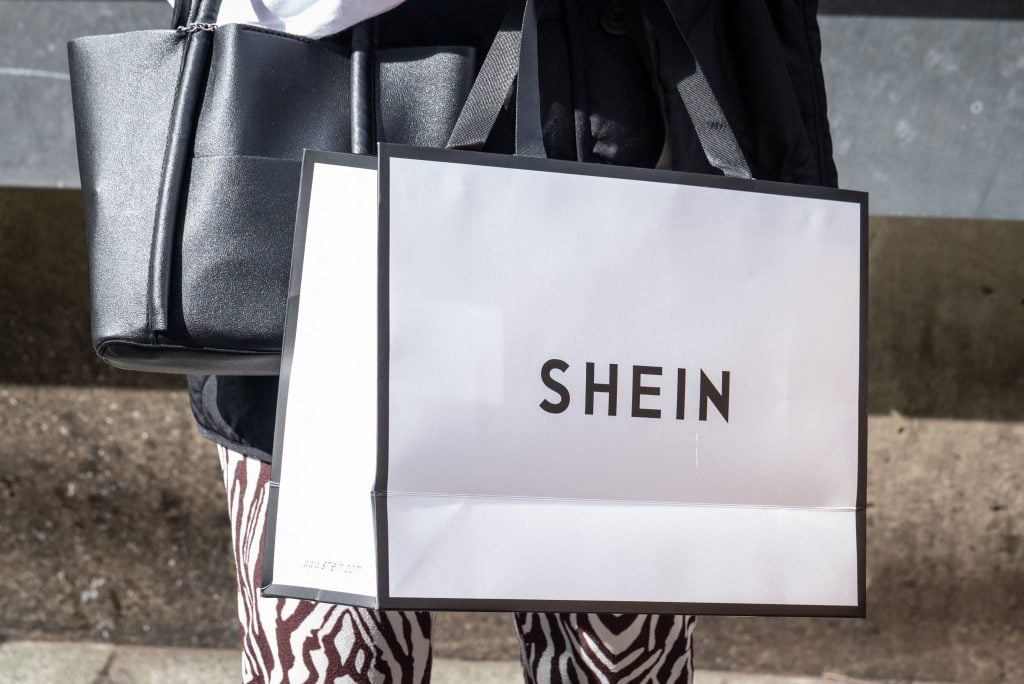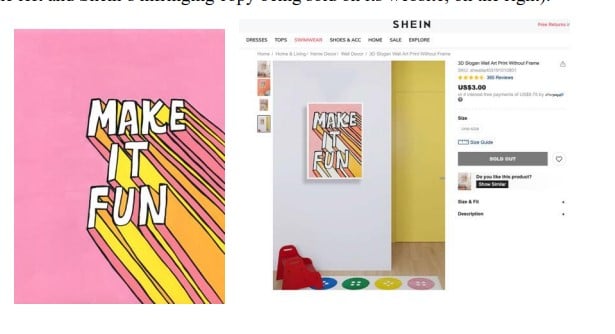Law & Politics
A Group of Artists Is Suing Fast-Fashion Giant Shein, Claiming It Used a ‘Secretive Algorithm’ to Identify and Steal Their Work
The lawsuit labels Shein 'a greater societal threat than TikTok.'

The lawsuit labels Shein 'a greater societal threat than TikTok.'

Adam Schrader

The Chinese online retailer Shein has allegedly used a “secretive algorithm” to identify trending art and steal the designs from the artists who made them to reproduce on its fast-fashion clothing.
The revelation was made in a lawsuit filed by artists Krista Perry, Larissa Martinez, and Jay Baron filed in a U.S. District Court in Los Angeles. The artists allege the company violated federal laws for Racketeer Influenced and Corrupt Organizations, known as RICO.
“Shein is actually a greater societal threat than TikTok because it contributes mightily to serious problems beyond data security and privacy,” the lawsuit reads.
“The brand has made billions by creating a secretive algorithm that astonishingly determines nascent fashion trends… coupling it with a corporate structure, including production and fulfillment schemes that are perfectly executed to grease the wheels of the algorithm, including its unsavory and illegal aspects,” the lawsuit reads.
The company’s corporate website simply boasts that it employs “cutting-edge technologies and processes in design and sourcing” but does not explain the technology it uses.
“Shein takes all claims of infringement seriously, and we take swift action when complaints are raised by valid IP rights holders,” a Shein spokesperson said in an email to Artnet News. “We will vigorously defend ourselves against this lawsuit and any claims that are without merit.”
The company did not respond to questions on why it believes the lawsuit is without merit and for more clarity on how it uses algorithms.
The plaintiffs additionally claim that Shein has ripped off their designs for its products, maintaining that “exact copying is part and parcel of Shein’s ‘design’ process and organizational DNA.”
“Certainly, Shein’s designs being so good is due, in some degree, to intellectual property misappropriation,” the lawsuit reads. “On information and belief, most of their merit derives from the minds of other designers, whose permission is never obtained or even sought.”

A work by artist Krista Perry, left, was allegedly plagiarized by Shein using a secretive algorithm, pictured right. Photo courtesy of U.S. District Court for Central District of California.
The lawyers for the artists noted that details about the alleged algorithm remain secret but said that “it’s possible to infer certain facts about Shein’s algorithm by looking at its results.”
Shein’s Terms and Conditions indicate that use of the site constitutes a waiver of class-action rights and stipulates that all content on the site is protected by copyright owned by the company: “As we ask others to respect our intellectual property rights, we respect the intellectual property rights of others.”
This is not the first time the retailer has allegedly stolen designs from artists. The U.S.-China Economic and Security Review Commission prepared a damning brief for Congress earlier this year on the company’s practices, citing a Wall Street Journal report noting at least 50 pending lawsuits.
“Shein draws on customer data and search history with the assistance of artificial intelligence (A.I.) algorithms to discern emerging fashion preferences and patterns,” the document reads. “With these rapid insights, Shein can begin manufacturing and delivering clothes to market ahead of competitors.”
As reported by Dazed, big box designers have also targeted Shein in lawsuits that have mostly been settled quietly out of court. Those companies include Levi Strauss, the maker of Dr. Martens, and Ralph Lauren, among others.
Last year, two artists on TikTok also filed a lawsuit against Shein claiming their work was stolen without compensation.
This latest lawsuit further lists other “societal threat[s]” posed by Shein including environmental damage, sweatshop labor conditions, and child safety, while highlighting that the company’s “shell game” of a business model could spread to other industries.
“This is a monumental case that has the potential to positively impact the global art and design communities who have long been at odds with Shein,” Jeff Gluck, an attorney for the artists, said in an email to Artnet News.
More Trending Stories:
An Israeli First-Grader Stumbled on a 3,500-Year-Old Egyptian Amulet on a School Trip